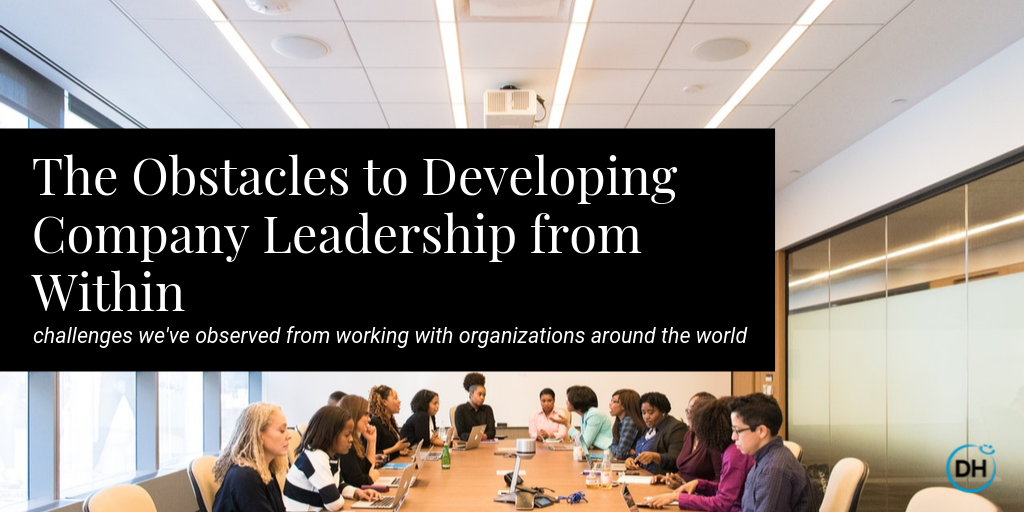
To achieve progress on strategic company goals, all organizations need leaders. When we hear the word “leader” we often associate it with the roles of managers, CEOs, or directors. Is every person you have in that role really a great leader though? Is your company confusing true leadership with just filling in roles and titles? Today we live in a fast-changing environment where leadership is in high-demand but true, adaptable leaders are in low supply. From my experience in consulting and working with both soon-to-be leaders and formal leaders around the world, here are my observations about the top obstacles to personal leadership development:
Scaling your company involves growing your workforce, which creates the necessity to have leaders who can both manage and lead. In the rush to promote employees to management positions, most organizations overlook what’s needed to train their new managers. Everyone is ready to jump into a role with higher pay and a better title, but not everyone is ready to step into this role with more accountability for strategic direction and people management skills. This lack of preparedness and confidence causes people to fear accountability or decision-making.
For example, while we were in the information-gathering phase with one of our clients, we learned of a common situation happening among the leadership. At times, there would be long threads of emails [sometimes 90 emails long] of discussion among 20 leaders but no decisions were being made and nobody would step up to lead the decision-making process. Instead, they would ping-pong or volley the issue back and forth and no solution was made. Instances like this would result in delayed progress and a cultural acceptance of passive responsibility [which is not the point of leadership].
Accountability can actually be taught. After a coach|sulting session with the same company, one of the sales managers told us how the next day she was able to get to a resolution on an issue by just picking up the phone and making a call - a far advancement from those 90-email thread chains!
Are you a busy, executive who wants to move your organization from surviving to thriving? Download our latest ebook!
Sometimes top leaders feel lonely in their roles because they’re unable to openly share their pains, worries, and challenges with anyone else. They fear that other leaders will judge them for not “toughing it out” or their employees will lose respect for them. Depending on the company culture, these outcomes may result. When a company creates boundary lines between who is a leader and who is not, it creates isolation between these two groups. In actuality, every employee should have some sense of leadership and ownership of their roles. This shift in thinking can help create better cooperation and connectedness among the entire workforce.
People often feel that they have limited control over their lives at work and at home. At work, they feel like cogs or gears in a bigger machine and their job is to just keep churning out work [and that’s it]. For many, they feel like victims of circumstance. With no control or freedom in their roles, what’s there to be engaged at work? Probably not much.
The way to encourage more responsibility at work is to give employees a sense of control over their roles. It can range from letting people choose their own titles, participate in projects they are passionate about, or giving them options for more flexible or remote schedules. That autonomy is something that humans need to thrive in their everyday lives. Without it, people lose confidence in their decision-making skills and leave it to others to decide their fate for them. What’s a direct result? Instances like the 90-email discussion thread or a culture that avoids tackling problems head-on.
Questions to reflect on:
- How do you see yourself as a leader of your life?
-Do you have a mindset that assumes circumstances happen to you or that you happen to them?
-What small change at work can make you happier?
-What could your company’s leaders do to create more accountability?
See how a DH Masterclass can create a foundation for leadership & accountability in your culture:

Naty has an entrepreneurial spirit, joyful personality, and leadership skills that can be backed by her work experience. Naty has over five years of experience in professional business advisory services at PwC, and served as the Chief Operating Officer for Groupon Russia. Her knack for leading with positivity and growing a feeling of connectedness among her customers brought her to DH as part of our business development team. Naty also spearheads our efforts to deliver happiness to Russian businesses and organizations.